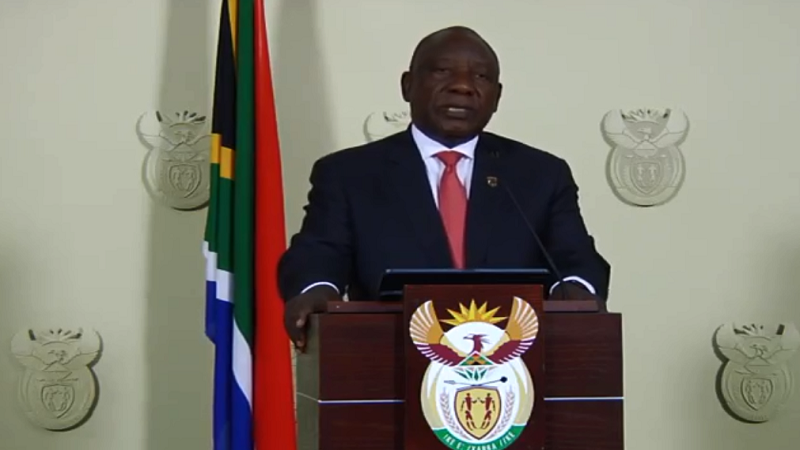“But seriously, a cloth mask is not something that is difficult to get. Even your T-shirt, even your scarf, even a piece of your clothing can be put over your nose and your mouth,” President Cyril Ramaphosa gave a stern dressing-down to South Africans.
In an unfamiliar tone, Ramaphosa delivered a sharp reprimand to South Africans who refuse to abide by Covid-19 regulations during his address to the nation on Sunday evening.
The president began by acknowledging that the storm of the coronavirus peak had arrived but had strong words against reckless behaviour, saying “we are not helpless in the face of this storm”.
A big focus of his speech was espousing behavioural change, with the president announcing that wearing masks is mandatory, with penalties for those who do not enforce it in buildings, shops and taxis.
Owners of public buildings and public transport operators would be legally obliged to ensure people on their premises wore masks.
While the country would remain on Level 3 of the lockdown
regulations, the sale and distribution of alcohol was immediately banned.
“We are by now all familiar with what we need to do to protect ourselves and others from infection. We need to wear a cloth mask that covers our nose and mouth whenever we leave home. We must continue to regularly wash our hands with soap and water or sanitiser. We must continue to clean and sanitise all surfaces in all public spaces.
“Most importantly, we must keep a safe distance – of at least 2 metres – from other people. There is now emerging evidence that the virus may also be carried in tiny particles in the air in places that are crowded, closed or have poor air circulation. For this reason, we must immediately improve the indoor environment of public places where the risk of infection is greatest.”
Ramaphosa’s address comes after weeks of criticism from his opponents in opposition parties who questioned his silence.
The president had last addressed the nation last month when he announced a readjusted alert Level 3, which saw the sale of alcohol being reintroduced.
Ramaphosa has been criticised by some, including the EFF, who accused him of abandoning ship, and the DA called him a spectator to the ravaging effect of Covid-19.
The EFF responded to the reinstatement of the alcohol ban with a proverbial “I told you so”, while the DA said Ramaphosa was diverting attention from real issues like government’s failure to build treatment and testing capacity.
The ban on alcohol sales comes as a victory for Eastern Cape Premier Oscar Mabuyane, who called for it a week after it was reintroduced.
Other premiers weighed in, raising concern about overwhelmed public healthcare systems in various provinces.
Ramaphosa seems to be in agreement. In his address on Sunday evening, he said there is clear evidence that the resumption of alcohol sales has resulted in substantial pressure being put on hospitals, including trauma and intensive care units, due to motor vehicle accidents, violence and related trauma.
“Most of these and other trauma injuries occur at night. Therefore, as an additional measure to reduce the pressure on hospitals, a curfew will be put in place between the hours of 9pm and 4am,” the president said.
The immediate ban on the sale of alcohol could become a bone of contention for Ramaphosa’s Cabinet in the coming weeks with many caught by surprise.
Interim DA leader John Steenhuisen said in response:
The argument that alcohol trauma is putting the system under pressure is simply an excuse and cover-up for this failure. Alcohol is the scapegoat, not the reason. A curfew gives an illusion of control, when quite clearly the government has no control over the real issue, which is treatment and testing capacity. These are false narratives that should not divert us from what we need to do.
The president conceded that the National Coronavirus Command Council and Cabinet have considered returning all or parts of the country to a higher alert level, either to Level 4 or Level 5, but that suggestion was proved to be moot.
“The advice we have received is that taking this step now would not necessarily achieve a significant reduction in the rate of transmission and would come at an extraordinary economic cost, putting more livelihoods at risk and potentially causing long-lasting social harm,” he said.
The biggest concession Ramaphosa made was allowing taxis to operate at 100% capacity for short distance trips. Taxis which travel further than 200km should have a maximum capacity of 70%.
Source: News24






 WhatsApp us
WhatsApp us 

